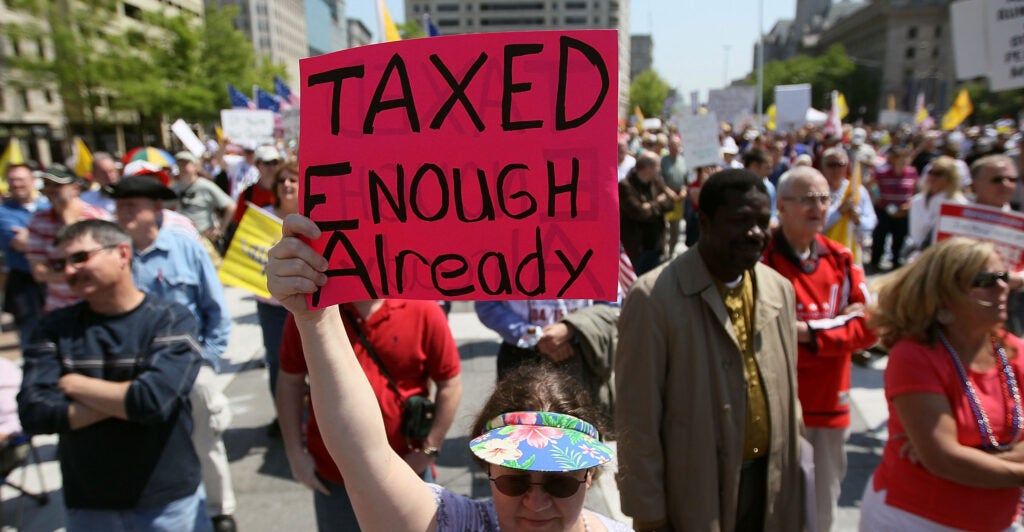Among the earliest uses of the written language was the assessment and collection of taxes.
Although we’ve moved on from the king taking grain directly from your field to the IRS, Tax Day remains as a reminder of this ancient—and favorite—pastime of government.
However, focusing on when or how taxes are collected misses the point. The government doesn’t wait for you to pay your taxes to begin pledging your money.
Whenever the government makes a promise, signs a contract, or writes a check, it does so by using you as collateral, putting up your future tax dollars.
In essence, while you’ve been working hard to earn money, the government has been ordering rounds at the bar for friends of the bureaucracy.
Tax Day—which falls on Monday, April 18, this year—is merely when the bar tab is paid, not when the drinks are ordered.
Government spending is the first tax on hardworking Americans. The continuous process of the government ordering drinks in your name is what requires the tax and other burdens of the government to eventually be felt.
The power of government to commit your money is the power from which all the burdens of government flow.
Though governments and politicians have developed a multitude of ways to finance the spending, all those methods end up taking the money out of your wallet one way or another.
As burdensome as federal taxes are for most American families, that’s just the start.
Entrepreneurs are taxed, forcing lower wages and higher consumer price levels. Then investors are taxed, causing fewer startups to compete against big businesses and leading to slower job growth.
After robbing families of some of their purchasing power and stunting economic growth through countless overlapping taxes, the government still doesn’t raise enough to pay the tab. Taxation is only expected to cover roughly 80% of federal spending over the next decade.
To pay for the other 2 of every 10 drinks at the bar, the government turns to good old-fashioned deficit spending, the same kind that has driven the national debt to $30.4 trillion (more than $230,000 per household).
When you or I borrow money, the expectation is that we will work to provide value to someone to earn enough money to make good on the debt. That, tragically, isn’t the case with the government. When the government borrows money, it does so by promising to take that money by force from someone else through future taxes.
This future promise of taxes—like a storm on the horizon quickly approaching—has serious negative affects on the economy today. The government cannot borrow an infinite amount of money forever.
As economist Herbert Stein put it: “If something cannot go on forever, it will stop.”
To get around this, the government increasingly just gets the Federal Reserve to print the money. Where does the new money come from? Like a thief siphoning your car’s gasoline, it comes out of the purchasing power of existing dollars, what your money will buy.
And so, again, while you or I have to earn money with real work and bringing value to others, the government simply takes it.
Dumped into the economy, this new money quietly devalues your savings and paychecks. Ultimately, it devalues your hard work and planning for the future.
Since the COVID-19 pandemic began, roughly half of the new federal debt incurred has been effectively printed by the Federal Reserve in this way. That spiked the Fed’s assets by 890% in the past 14 years, dumping $8 trillion of new cash into circulation, like pouring water into the wine of your life savings.
Perhaps the most important aspect of this alarming trend is how new it is, and why.
Hunting for ways to finance its deficit spending, the government—backed by the unchecked power to raise taxes into the future—gobbles up investment dollars across the economy. This crowding out starves the private sector and the growth of wages and jobs.
The volume of those deficits is projected to be so immense that, in just over a generation, interest on the federal debt alone could consume 46% of all federal taxation.
The unprecedented pressure created by this breathtaking level of federal deficit spending has pushed the Fed to print those trillions of new dollars to avoid some of the crowding out.
Of course, that doesn’t remove the cost to American families. It simply shifts the cost to that other tax imposed by the government; namely, inflation.
The Fed recently published a study concluding that most of the current inflation is the direct result of excessive federal spending, not COVID-19, or Russian President Vladimir Putin, or whatever other excuse they’re peddling this week.
This is a sobering reminder that all government financing ultimately comes at the expense of hardworking Americans.
Though the cost of government can be felt in a million places and during each day of the year, it doesn’t start there. It started when the government took you as livestock, pledging your life’s work and life savings to its vote-buying spending programs.
So, this Tax Day, as you walk away from the bar having covered the government’s drinks, remember to listen for the government calling out “another round,” as the bills pile up anew.
Have an opinion about this article? To sound off, please email letters@DailySignal.com and we’ll consider publishing your edited remarks in our regular “We Hear You” feature. Remember to include the url or headline of the article plus your name and town and/or state.
